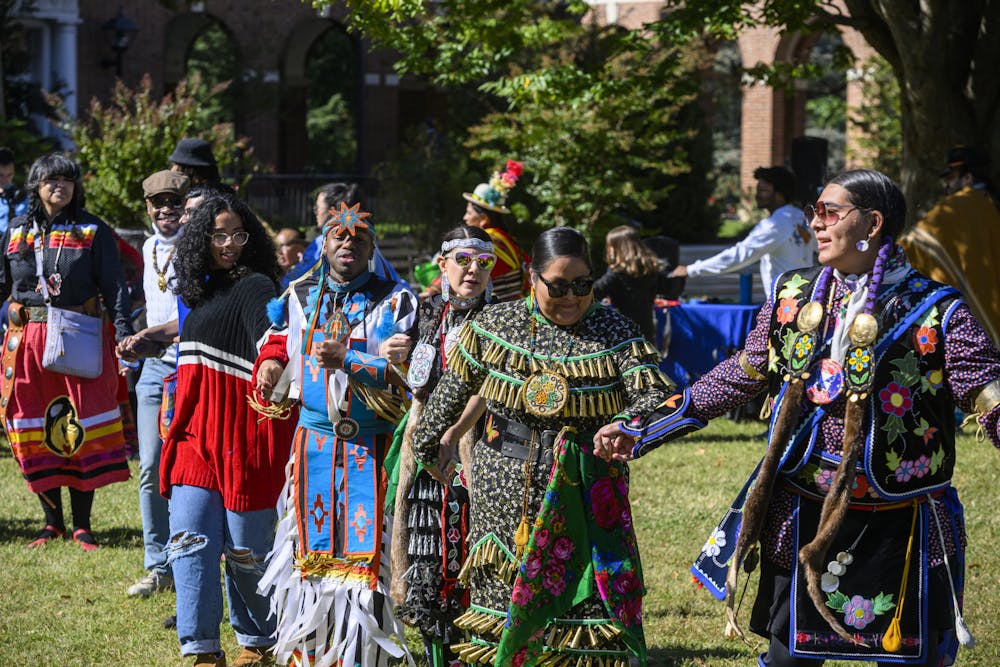The University hosted its fourth annual Indigenous People’s Day Pow Wow on Oct. 10. Tribes from Washington, D.C., Maryland, Virginia and Delaware gathered on Keyser Quad to commemorate Indigenous culture with intertribal music, dances and food.
President of Indigenous Students at Hopkins (ISH) and member of the Mi'kmaq Nation Hayden Fox explained the significance of powwows in an interview with The News-Letter.
“[A] powwow is a big celebration where people come together and share our dances and songs, from traditional dancing to grass dancing to smoke dancing,” he said. “A big part of it is paying homage to our ancestors and continuing to express our culture.”
In an interview with The News-Letter, Director for Diversity and Inclusion Joseph Colon described the Powwow as an important step towards the school’s commitment to acknowledging marginalized and oppressed Indigenous communities. He emphasized the narrative shift from celebrating Columbus Day to treating Indigenous perspectives as the focal point.
“[The Powwow] allows us to be much more introspective about the real history behind not only the atrocities that occurred but also how people have persevered and really still celebrated today,” he said. “It's not about substituting one for the other. It's about making a statement about justice in a sense of equity and highlighting our history.”
Senior Edla Teshome has been attending the Powwow every year to learn about Indigenous culture. Similar to Colon, she expressed her appreciation for the societal shift from celebrating Columbus Day to acknowledging Indigenous history in an interview with The News-Letter.
“It's giving more power to Indigenous people instead of Christopher Columbus Day, which is what we grew up knowing today to be,“ she said. “The change of everybody being more aware of the history gives them a place to showcase their culture, which is really important to see.”
In an interview with The News-Letter, sophomore Beatrice Opoku-Boahene highlighted that the event provided her with a rare opportunity to learn about Indigenous culture, which is something she does not see a lot in day-to-day life.
While Fox has observed tremendous growth in the number of members in ISH, as well as the general Indigenous presence on campus, he maintained that the University still lacks Indigenous representation.
“From the student body all the way to the faculty and professors, we [Indigenous groups] are very underrepresented,“ he said. “I would say that a big part of the Powwow today is to bring awareness to our culture to let people on campus know that we are still here.”
Fox discussed the unacknowledged rich Indigenous roots of the game of lacrosse, which has a strong presence on campus. Modern-day lacrosse originated from a traditional indigenous game called stickball.
“A lot of people don't recognize that lacrosse is a traditional Indigenous sport that was played for thousands of years by Indigenous people, with different variations all across North America, but all playing with a stick and a ball,“ he said. “The first games were played between the animals and the birds, and we continue to play lacrosse to honor our creator.”
To address the issue of underrepresentation, Fox suggested adding more Indigenous history courses to the Hopkins curriculum.
Colon asserted that the underrepresentation of Indigenous people is an issue that persists on a national and institutional level.
“A lot of the social justice issues that we've seen in the past years, whether it's police brutality or any type of colonialist policies, also affects Indigenous communities,” he said. “But we don't see it because it's not as open. There are also things happening within the reservations, like missing women and violence against women.”





